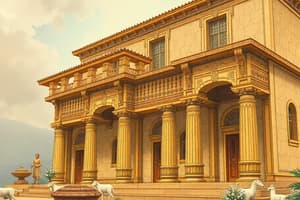Podcast
Questions and Answers
Arthur Evans is the name of the English archaeologist who found remnants of the Minoan palace in Knossos.
Arthur Evans is the name of the English archaeologist who found remnants of the Minoan palace in Knossos.
True (A)
The Minoan civilization collapsed around 1400 to 1230 BCE due to a volcanic eruption and foreign attacks.
The Minoan civilization collapsed around 1400 to 1230 BCE due to a volcanic eruption and foreign attacks.
True (A)
The Mycenaeans belonged to the Indo-European race.
The Mycenaeans belonged to the Indo-European race.
True (A)
The name of the first civilization in Greece was derived from Minos, the mythic king of the Minoan Kingdom.
The name of the first civilization in Greece was derived from Minos, the mythic king of the Minoan Kingdom.
The capital of the Minoan Kingdom was Mycenae.
The capital of the Minoan Kingdom was Mycenae.
Flashcards are hidden until you start studying
Study Notes
Minoan Civilization
- Arthur Evans, an English archaeologist, discovered remnants of the Minoan palace in Knossos.
- The Minoan civilization declined between 1400 and 1230 BCE due to a devastating volcanic eruption and foreign invasions.
- The term "Minoan" is derived from Minos, the mythic king of the Minoan Kingdom, in Greek mythology.
Minoan Kingdom
- The capital of the Minoan Kingdom was not Mycenae, but rather Knossos.
- The Mycenaeans were a distinct civilization that belonged to the Indo-European race.
Studying That Suits You
Use AI to generate personalized quizzes and flashcards to suit your learning preferences.




